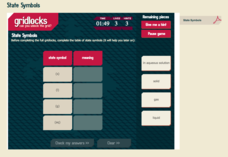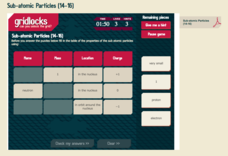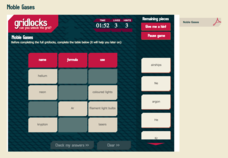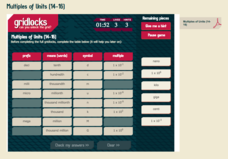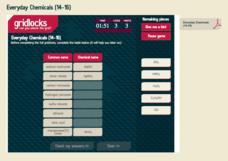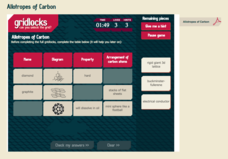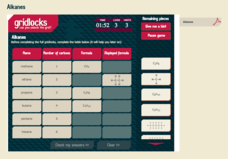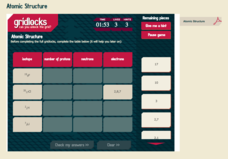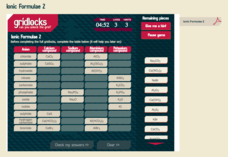Royal Society of Chemistry
State Symbols
When water is a solvent in a chemical equation, we consider it an aqueous solution. Scholars match the name of four states of matter to their proper symbol in a chemical equation. Four puzzles provide repetition to help pupils remember...
Royal Society of Chemistry
Sub-Atomic Particles (14-16)
In 1897, J.J. Thomson discovered the electron, the first subatomic particle proven to exist. Scholars review their understanding of electrons, protons, and neutrons as they work through the puzzles. Each puzzle connects two or three...
Royal Society of Chemistry
Pollutants in Air (14-16)
Polluted air contains more than 200 chemicals that age the skin, causing urban women to appear 10 percent older than their rural peers. An interesting interactive connects air pollutants and related data. Scholars work their way through...
Royal Society of Chemistry
Noble Gases
It is best to avoid jokes about noble gases; they get no reaction. Scholars match the noble gases to their symbols and uses. Then they solve three gridlock puzzles reviewing the material while applying some simple logic.
Royal Society of Chemistry
Multiples of Units (14-16)
Most mnemonics for remembering the metric system only include seven words. Scholars need to know a few more to complete the included puzzles. They match the prefix to the meaning, symbol, and multiple in a series of four increasingly...
Royal Society of Chemistry
Ionic Formulae 1
The ionic formula for banana would be BaNa2. Scholars work their way through four puzzles reviewing ionic formulas. Each puzzle requires scientific knowledge as well as logic and problem-solving skills.
Royal Society of Chemistry
Flame Test Colours
Scientists identify elements by the color of flame they produce because each element is defined by exactly one line on the emission spectrum. By completing a series of puzzles, scholars reinforce their knowledge of the results of flame...
Royal Society of Chemistry
Everyday Chemicals (14-16)
Two men want drinks and the first orders H2O. The second man orders H2O too, but he dies. Scholars apply their knowledge of H2O2 and other everyday chemicals during the activity. They match chemical formulas to common chemical names in a...
Royal Society of Chemistry
Allotropes of Carbon
Carbon takes on many forms including diamond, graphite, and buckminsterfullerene. Scholars review their knowledge of these three allotropes of carbon as they complete four puzzles. The first acts as a general review, and the other three...
Royal Society of Chemistry
Alkanes
Alkanes contain only single bonds and have no functional groups. Scholars match the properties of six alkanes in a series of four puzzles. Problem solving and logic help cement the concepts with repetition.
Royal Society of Chemistry
Atomic Structure
Changing the number of neutrons in an atom makes it an isotope, but it does not change the element. Pupils complete logic puzzles, matching isotopes with their unique number of protons, neutrons, and electrons. Either on paper or timed...
Royal Society of Chemistry
Amines and Related Compounds
Scientists call a molecule that contains a nitrogen atom that behaves as a base an amine. Four puzzles, related to amines and similar compounds, challenge scholars to prove their knowledge. After passing each puzzle, the next increases...
Royal Society of Chemistry
Units of Volume
Did you know in the UK a quart is smaller than in America? This explains why a standard unit of measure is necessary for volume. Young scientists learn the similarities and differences between five different units used to measure volume....
Mr. Nussbaum
THE Founding Father
Who is the founding father—George Washington, Thomas Jefferson, or Benjamin Franklin? Scholars decide which of three early Americans, should be crowned the founding father of America based on research. Then, they compose a persuasive...
ThoughtCo
Thomas Jefferson Crossword Puzzle
What was the name of the house Thomas Jefferson designed? Where was Thomas Jefferson born? Complete a crossword puzzle centered around the third president of the United States.
ThoughtCo
Thomas Jefferson Word Search
Look for 11 words associated with Thomas Jefferson and his life in a simple Jefferson-themed word search. It includes words like Monticello, Louisiana Purchase, George Clinton, and Thomas Jefferson.
ThoughtCo
Thomas Jefferson Matching Activity
What are some notable happenings that occurred during Thomas Jefferson's life and presidency? Give young historians a worksheet about the life and accomplishments of Thomas Jefferson.
Yummy Math
Sweethearts Candy
Sweethearts® candies are a beloved Valentine's Day treat—so much so that eight billion hearts are produced every year around the world! Learners use number sense reasoning and critical thinking to solve nine word problems about the...
Yummy Math
Parametric Equations and a Heart
Trigonometry, art, and Valentine's Day come together in a creative activity about parametric equations. Learners calculate several equations before graphing them either by hand, on a graphic calculator, or Excel spreadsheet to curve...
Royal Society of Chemistry
Oxide Types
Amphoteric compounds act as both an acid and a base. Scholars apply their knowledge of the four oxide types while completing four puzzles. They match a sample of each type of oxide with the corresponding reaction.
Royal Society of Chemistry
Ionic Formulae 2
Scientists call ions with a negative charge anions. Scholars work through one matching puzzle and four logic puzzles reviewing the chemical formulas for anion ions. Each level increases in difficulty and solidifies the concept in pupils'...
Royal Society of Chemistry
Hydroxide Precipitates
When two liquids combine and a solid forms, the new substance is called a precipitate. Scholars test their knowledge of hydroxide precipitates and their properties. A series of four increasingly difficult puzzles challenge their logic...
Royal Society of Chemistry
Forensic Tests
Flame tests determine if there is a specific metal in a chemical compound. Young forensic scientists review their understanding of flame tests and hydroxide precipitates by solving puzzles. The timed review encourages mastery.
Royal Society of Chemistry
Esters from Alcohols and Acids
Fats and oils often contain esters, which sometimes find their way into perfumes due to their pleasant smells. Scholars match the name of esters made from four different types of alcohol and four different types of carboxylic acids....


